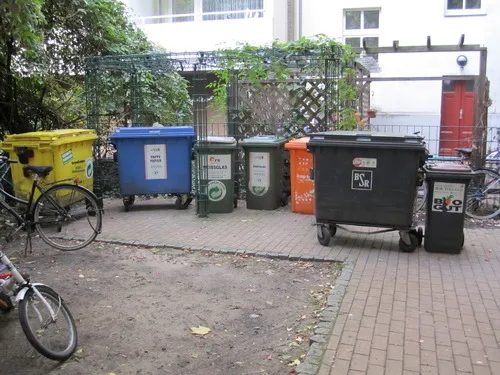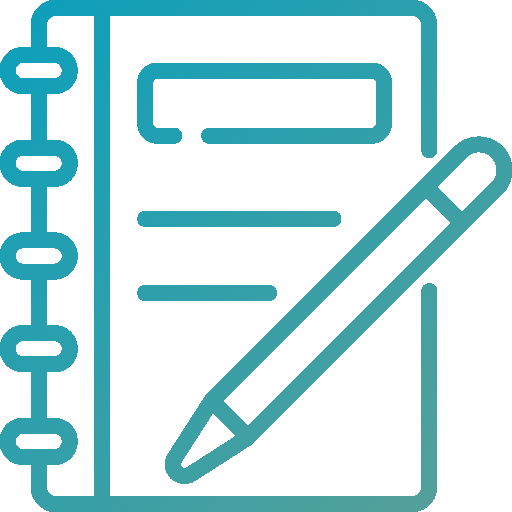
One of the first things you'll notice after moving to Berlin is that recycling is taken very seriously in Germany. If you're standing in front of five different bins wondering where your yogurt cup goes, you're not alone. Every newcomer to Berlin has been there.
This guide will walk you through everything you need to know about sorting trash and recycling in Berlin, so you can avoid those awkward moments with your neighbors (and potential fines).

Understanding Berlin's waste disposal system

The Berliner Stadtreinigung (BSR) is the city's waste management company, responsible for keeping Berlin clean and working toward becoming a waste-free capital. They handle everything from your household bins to keeping streets safe in winter, and they've developed a comprehensive system that turns waste into resources.
The philosophy is simple: separate your waste properly, and most of it can be recycled, composted, or converted into energy. Berlin doesn't just throw everything into landfills—your organic waste becomes biogas that fuels BSR vehicles, your paper gets recycled, and even your non-recyclable waste is converted into heat and energy at modern waste-to-energy plants.
The five main bins you need to know
🔵 Blue bin (Blaue Tonne) - Paper and cardboard
This one's pretty straightforward. The blue bin is for paper and cardboard only.
What goes in:
What doesn't go in:
One important note: Don't use plastic bags for the blue bin. If you're carrying paper to the bin, just carry it loose or use a paper bag.
🟡 Yellow/Orange bin (Wertstofftonne) - Packaging and recyclables
The yellow or orange bin is for plastic, metal, and composite packaging. Look for items with the "Grüner Punkt" (Green Dot) logo—those definitely belong here.
What goes in:
What doesn't go in:
🟤 Brown bin (Biomüll) - Organic waste
All food scraps and biodegradable materials go here. BSR turns this into compost and biogas, which is then used to fuel their vehicles.
Use only paper bags for the brown bin, never plastic or "biodegradable" plastic bags.
What goes in:
What doesn't go in:
⚫ Grey bin (Restmüll) - Non-recyclable waste
This is your catch-all for things that can't be recycled. While it's called "non-recyclable," BSR still uses this waste productively by converting it into energy and heat at their waste-to-energy plant.
What goes in:
What doesn't go in:
♻️ Glass recycling bins (Glasiglus)
Many apartment buildings have glass bins on-site, but not every building. Instead, you'll find glass recycling containers (called Glasiglus) throughout your neighborhood.
There are three types, and sorting by color is important for the recycling process:
What goes in:
What doesn't go in:
The Pfand system: Get money back

Germany's deposit system (Pfand) is brilliant once you understand it. Many bottles and cans have a deposit ranging from 8 cents to 25 cents. Instead of recycling them in bins, return them to any supermarket's bottle return machine (Pfandautomat) to get your money back.
Items with Pfand:
Look for the Pfand symbol or check the receipt when you buy drinks. The return machines are usually near supermarket entrances. Just feed your bottles and cans into the machine, and it'll print a voucher you can use toward your purchase or cash out at the register.
Pro tip: Keep a bag or crate near your door for collecting Pfand bottles. They add up quickly, and you can return them on your next shopping trip.
Bulky waste and large items

Got an old sofa, mattress, or broken appliance?
For this, Berlin has the BSR Recycling centers.
What you can bring:
You have several options to use those services:
BSR Recycling Centers (Recyclinghof)
Berlin has 14 recycling centers where you can drop off up to three cubic meters of bulky waste for free per visit. Six of these centers also accept hazardous materials like paint, oil, and chemicals.
Find your nearest recycling center at www.bsr.de/recyclinghof
BSR pickup service
BSR can collect bulky waste from your address, but they charge a fee starting at €50.
Book online at www.bsr.de/sperrmuell
Kieztag (Neighborhood collection days)
Throughout the year, BSR organizes free "Kieztag" events in different neighborhoods where you can drop off bulky waste for free and even find items others are giving away.
Check www.bsr.de/meinkieztag for upcoming dates in your area.
Before you throw it away: BSR's upcycling options
Berlin is serious about reducing waste, and BSR offers several ways to give your stuff a second life:

Other common items
Clothes and shoes: If they're still in good condition, sell or donate them. Berlin has numerous clothing donation bins throughout the city. If they're worn out, bring them to a recycling center.
Christmas trees: BSR collects Christmas trees in January. Just leave your tree (without decorations) on the curb. Check your trash collection calendar (Abfuhrkalender) for the exact dates in your neighborhood.
Still not sure where something goes?
BSR has an online tool called the "Abfall ABC" (Waste ABC) at www.bsr.de/abfall-abc. Type in what you want to throw away and it tells you exactly which bin to use. It's in German, but your browser can translate it. Bookmark this for those moments when you're holding something weird and have no clue where it goes.
What happens if you get it wrong?
The practical issue: If your building's bins are contaminated with incorrect items, BSR may refuse to collect them. This means overflowing trash bins for everyone until someone sorts it out.
The legal issue: There are fines for improper waste disposal which you or your building might receive at the end of the year.
The social issue: Your neighbors might not be too happy if you're consistently messing up the recycling. But if you're new and making an effort, most people will understand."

What's next?
Now that you've tackled Berlin's recycling system, you're one step closer to feeling at home in the city.
If you're settling in Berlin and have questions about other aspects of life here—like health insurance, liability coverage, or protecting your belongings in your new apartment—we're here to help. At Versicherungsbüro Weiss, we specialize in guiding expats and international professionals through the complexities of German insurance and bureaucracy, always with transparent, independent advice in English.
Welcome to Berlin, and happy recycling! ♻️